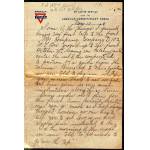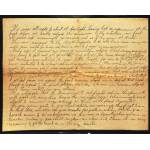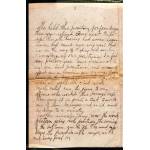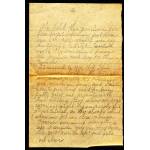WWI Experience of Pvt. William R Bird
1918
Add to Favorites:
Add all page(s) of this document to activity:
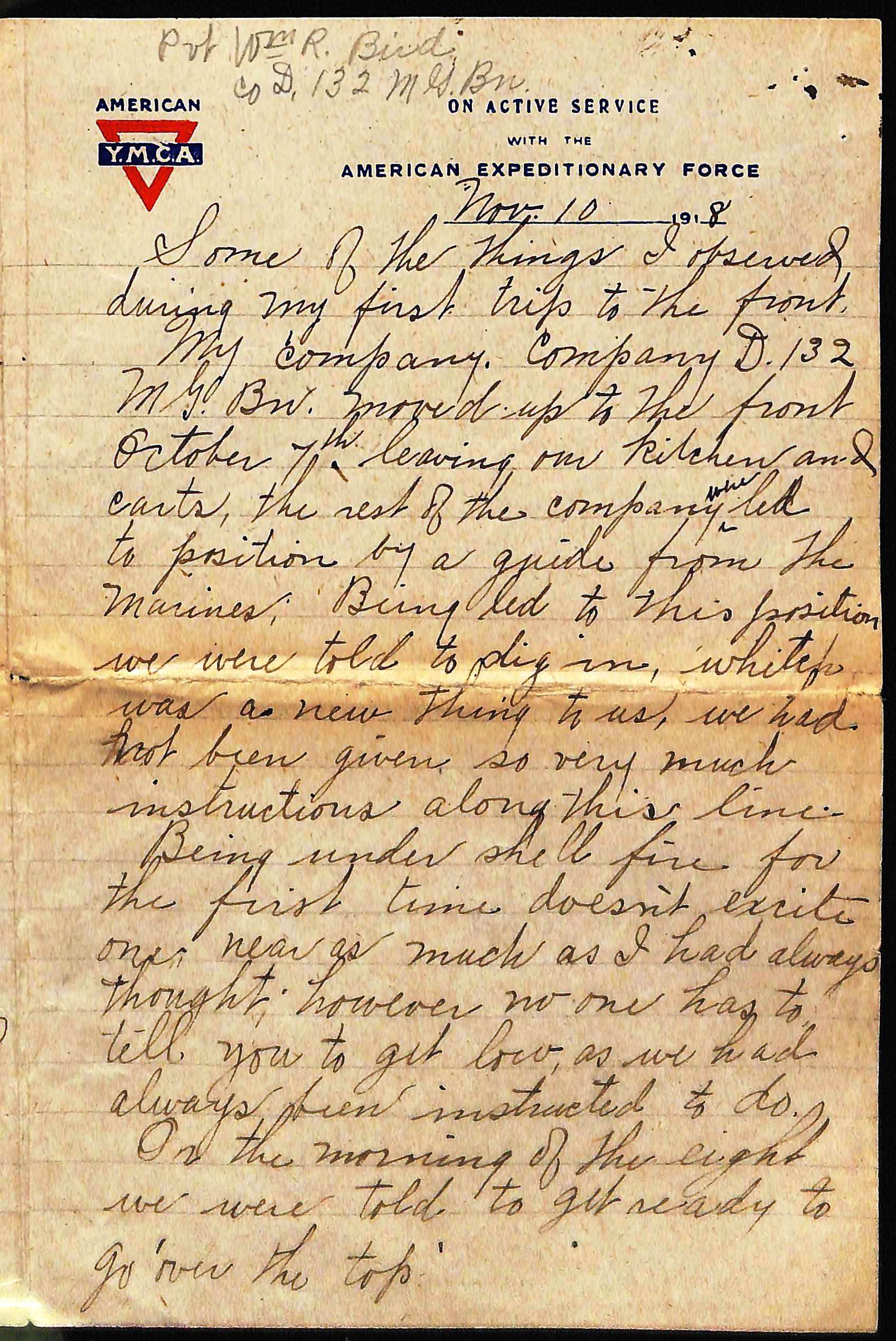
Add only page 1 to activity:
Add only page 2 to activity:
Add only page 3 to activity:
Add only page 4 to activity:
In this World War I account, Pvt. William R. Bird describes his experience at the front:
This document comes from a collection of "Personal War Experiences" that WWI servicemen were asked to write after their return from the front during the Meuse-Argonne Offensive. The men were personnel of the 36th Division – known as the Lone Star Division, formed from the Texas and Oklahoma National Guard – of the American Expeditionary Forces (AEF).Being under shell fire for the first time doesn’t excite one near as much as I had always thought, however no one has to tell you to get low, as we had always been instructed to do.
Transcript
[Handwritten] Pvt Wm R. BirdCo. D, 132 M.G.BN. [Handwritten]
[Letterhead] American Y.M.C.A.
ON ACTIVE SERVICE
WITH THE
AMERICAN EXPEDITIONARY FORCE [Letterhead]
Nov. 10 1918
Some of the things I observed during my first trip to the front. My company, Company D. 132 M.G. BN. moved up to the front October 7th, leaving our kitchen and carts, the rest of the company were led to position by a guide from the Marines. Being led to this position we were told to dig in, whitch (sic) was a new thing to us, we had not been given so very much instructions along this line. Being under shell fire for the first time doesn't excite one near as much as I had always thought; however, no one has to tell you to get low, as we had always been instructed to do.
On the morning of the eight we were told to get ready to go 'over the top.'
Going up I carried two boxes of ammunition, whitch (sic) I had always considered very heavy to fall and get up with, but when the enemy barrage of artillery and machine gun started, it was little trouble for me to fall and get up as I had been instructed to do when advancing under fire. On reaching the pine woods, the enemy shell fire seemed to increase, here we learned just what the most important weapon of modern warfare was, that was a pick & shovel. It is very essential for each one to have a hole to get in during a shell attack. I got lost from my squad the first evening, stayed in a dug out that night, found a squad of the first platoon the next day, who were in reserve, stayed with them, untill (sic) we were relieved.
It is noticeably that the German will not fight out in the open, they will fight like every thing long as they are under cover, but seemingly can't stand to see our boys coming at them with fixed bayonets.
We were given quite a gas attack while we were up this first time the third day, we wore our gas masks for quite a while, but the gas doesn't seem to be so dangerous, in open war, as formally (sic formerly) when we were in the trenches, unless a gas shell makes a close hit, then it is very necessary to get the mask on in the six counts.
We held this position for four days then were relieved. Our next trip up, We all having had some experience, had much more success, that is in the way of keeping hid and camouflaging our positions; In fact, my platoon was never fired on while in our last positions, and we surely (illegible) over a machine gun barrage from here; for the boys to go over the top, it was all just like clock work.
Much credit can be given to our officers who worked this barrage out. Am sure it is quite a task to work one of these barrages out, as it must be done to a minute.
We held this position for four days, before we put down our barrage whitch (sic) was on the evening of October twentieth eight. We were relieved from this position next day by the French.
It seemed to me, that the enemy were holding the line where we were, mostly by artillery and machine guns, and I shall have to give them credit for being pretty quick and accurate with their artillery; But when our boys come on sight, they seemingly can't stand hitched; as they always retreat when we go in close range. However, summing every thing up, I consider any one very lucky that goes 'over the top' and gets out alive.
Another singular thing was the second platoon going into position the evening of the (illegible) time over the top. They went up along the front in rifle range, with out being fire on.
This primary source comes from the Records of the American Expeditionary Forces (World War I).
National Archives Identifier: 77416553
Full Citation: Personal Experience of World War I from Pvt. William R Bird; 1918; Bird, William R. Pvt. 132nd M.G. Bn. Co. D 36th Division 1918, 236.33.61; Records of Divisions, 1917 - 1920; Records of the American Expeditionary Forces (World War I), Record Group 120; National Archives at College Park, College Park, MD. [Online Version, https://www.docsteach.org/documents/document/wwi-bird, April 27, 2024]Rights: Public Domain, Free of Known Copyright Restrictions. Learn more on our privacy and legal page.

